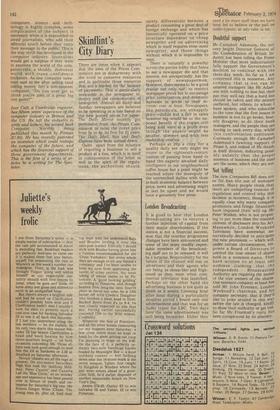Skinflint's City Diary
There are times when it appears that the aims of the Prices Commission are in disharmony with the need to conserve resources and in particular those resources that are a burden on the balance of payments. This is particularly noticeable in the newspaper industry and the consumption of newsprint. Almost all daily and Sunday newspapers are believed to be operating at a loss based on the new posted prices for paper. The Daily Mirror recently got permission from the Prices Commission to raise the cover price from 3p to 4p, its first for 21 years. The Daily Mail, Sun and Daily Express have been turned down.
Quite apart from the injustice of requiring a business to sell a product at a loss, which is in itself in contravention of the letter as well as the spirit of the regulations, the authorities should, surely, differentiate between a product consuming a great deal of foreign exchange and which has historically operated on a price structure dependent on cheap newsprint and on advertising which in itself requires even more newsprint, and those things without which it is impossible to exist.
There is naturally a powerful across-the-parties lobby that hates to see a newspaper die and that interest, not unexpectedly, has the support of newspapermen. However, there seems to be a good reason not only not to restrict newspaper prices but to encourage price cartelisation and dramatic increases in prices to their intrinsic cost at least. Newspapers, like periodicals, are unhappily price volatile but a fall in sales however big would be to the national benefit if the copies still being sold were at a profit even though the papers might be smaller, slimmer and with less readership overlap.
Perhaps at 20p a copy for a quality daily not only might we return to the eighteenth-century custom of passing from hand to hand the eagerly awaited daily intelligence in our neighbourhood coffee house but a point might be reached where the monopoly of the entrenched dailies with their in-built economic balance between price, news and advertising might at last be upset and we would have a genuinely free press.
London Broadcasting
It is good to hear that London Broadcasting are to receive a further injection of capital from their major shareholders. If the station is not a financial success, now that the overdue programme changes have been announced and some of the more readily expendable members of the broadcasting staff are to be released, it will be a surprise. Responsibility for the failure of the channel will rest on advertisers and their agents who are being as sheep-like and frightened as they were when commercial television was launched. Perhaps on the other hand the advertising business is not quite as dumb as it seems. Listening hour after hour during a particularly sleepless period I heard only one advertisement and that was for an audio typist for LBC. Two days later the same advertisement was still being broadcast. Either they need a lot more staff than we have been led to believe or the pull on audio-typists, at any rate, is nil.
Doubtful support
Mr Campbell Adamson, the not very bright Director General of the Confederation of British Industry has been telling the Prime Minister that most industrialists fully support the Government's decision to continue with the three-day week. So far as I am concerned this is nonsense. Any company that is not run by salaried managers like Mr Adamson with nothing to lose but their pay may well say that a hard line should be taken and the miners outfaced, but others, to whom I have spoken, and who subscribe to the view that the first lesson in business is not to go broke, heartily disagree, as do their bank managers, and the people they are having to sack every day, whilst this confrontation continues. Curiously enough Mr Campbell Adamson's fawning support of Phase 3, and indeed of Mr Heath, is itself divisive, indicating possibly unfairly that the proper interests of business and the state are the same; which they are not.
Not telling
The new Companies Bill does not so far ban the use of nominee names. Many people think that there are compelling reasons of regulation and control why this decision is incorrect, though it Is equally clear why many company promoters and fringe financiers have imposed their will oi;) Mr Peter Walker, who is not proposing to put more than the minimal element of disclosure into his Act. Meanwhile, London Weekend Television have somewhat autocratically decided to anticipate the new provisions — which will, under certain circumstances, empower a Board of Directors to unravel the true owner of shares held in a nominee name. They have written to at least one nominee claiming that the Independent
Broadcasting Authority are requiring g the nam es of the true owners of the shares. One nominee company at least has told Mr John Freeman, London Weekend's chairman, and his company secretary, that if they'd like to poke around in this waY before the law is changed, kindlY to show their authority or get lost. So far Mr Freeman's reply has been conspicuous by its absence.


































 Previous page
Previous page